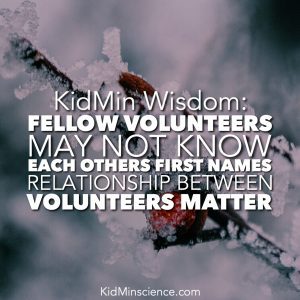
When I first started in Children’s Ministry, I decided to change the way that we did Sunday school. I inherited an old school way of doing Sunday school, with two teachers for 45 students in a classic classroom style setting. It was very teacher centered with these two teachers being the only adults in the room. Interestingly enough, we had a very, very hard time recruiting volunteers for this role. Why? I think it was because it was a very isolated experience. Two adults for 45 kids. We quickly transitioned to the popular large group/small group format when I came on staff. Our big selling point was that adults would now be serving alongside a group of 10-15 other adults in a room. There would automatically be adult interaction, collaboration, and connection. I felt very good about this transition for the whole first year. At the end of that first year, one of the volunteers looked at me and said “Hey, you know that lady who sits next to me in Sunday school. What’s her name?” With her question, the wind left my sails. I had made the assumption, foolishly, that two adults sitting close to one another in a Sunday school room would automatically bring about relational connection. It did not. You see, volunteers may be serving next to one another, but they may not know one another.
 A radical and bold move had to be made in order to rectify this situation. We began to have Friday and Saturday night gatherings, off-site, at someone’s home every quarter. Four times a year we would have soup, sandwiches, and game time for all of our key volunteers. We enjoyed time together, not just as volunteers and leaders, but rather as a family. Over time this relational movement caught on and we had a dozen families coming to these off site events every quarter. Eating together tends to build community. Momentum and traction was gained, and now volunteers were interacting with one another, rubbing shoulders in a way that made relational sense.
A radical and bold move had to be made in order to rectify this situation. We began to have Friday and Saturday night gatherings, off-site, at someone’s home every quarter. Four times a year we would have soup, sandwiches, and game time for all of our key volunteers. We enjoyed time together, not just as volunteers and leaders, but rather as a family. Over time this relational movement caught on and we had a dozen families coming to these off site events every quarter. Eating together tends to build community. Momentum and traction was gained, and now volunteers were interacting with one another, rubbing shoulders in a way that made relational sense.
Why did we do this on Friday and Saturday night? Wasn’t that asking a little much of our volunteers? We wanted to ensure that no one had an excuse not to come. I willingly spent my weekends entertaining our church volunteers to create a leadership culture and community.
A forward-thinking leader creates experiences and opportunities for relationships to happen. When you create a culture where volunteers know one another and are known by one another, relationships are formed. Out of those relationships, people want to continue serving. Relationships between volunteers matters. Fellow volunteers may not know each other. Seek to make relationships happen, no matter the cost.
Using science in ministry is a powerful strategy to have fun, keep it simple and reach people. This e-book provides the why and how of effectively using science in ministry!
